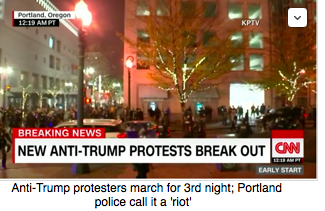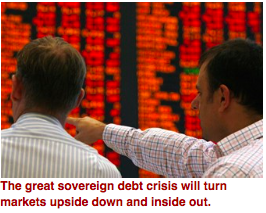Timing & trends
 Stunned political analysts are missing the most plausible argument explaining Donald Trump’s unexpected victory. The misreading of the American electorate stems from the political class’ acceptance of mistaken (and increasingly insane) economic dogma that has arisen over the past generation. Based on their flawed understanding of economics, the pundits could simply not understand why the electorate had become totally disillusioned.
Stunned political analysts are missing the most plausible argument explaining Donald Trump’s unexpected victory. The misreading of the American electorate stems from the political class’ acceptance of mistaken (and increasingly insane) economic dogma that has arisen over the past generation. Based on their flawed understanding of economics, the pundits could simply not understand why the electorate had become totally disillusioned.
According to the ideas favored by economists on Wall Street, in government, and in the Federal Reserve, Americans should be enjoying a marginally good economy. Unemployment is low, home values and the stock markets are high, credit is cheap and plentiful, prices are stable, auto sales are robust, healthcare is available to all, and GDP is growing, albeit at levels that are below optimal. These are conditions that would normally favor the incumbent party, and would discourage voters from taking a chance on an unknown who has promised to tear down the entire system. But that is precisely what happened. There can only be two explanations: Either Trump supporters were motivated by hatred strong enough to cause them to vote against their own economic interests, or they understood the economic reality better than the Ph.D.’s. I believe the people got it right.
In countless commentaries over the last few years, I have argued that the economy has been getting worse, not better, since the Great Recession of 2008. My points were simple. I suggested that the economic signals created by the Government’s deficit spending and the Federal Reserve’s eight year stimulus program were not creating growth but were actually hollowing out the real economy. I argued that prices were rising faster than Washington cared to admit and that inflation was an economic problem for ordinary Americans, not a magic elixir for growth. I argued that unemployment came down only because people either gave up looking for work (and then dropped out of the labor force), or took multiple low paying part-time jobs to compensate for the loss of good-paying full time jobs. I argued that increased workplace regulations, minimum wage increases, and Obamacare would create hostile conditions for small businesses and would stifle job creation. I argued that zero percent interest rates and quantitative easing were simply a benefit for the investor class and did nothing to generate real or sustainable growth (in fact those monetary policies guaranteed stagnation). I argued that these low rates would inflate debt bubbles in the auto and student loan sectors and would set up our economy for years of pain when those bubbles burst.
That is why my gut told me that Trump would win, despite the polls and the widely held belief that a Clinton victory was assured. I believed that voters (who live in reality, not the fantasy world concocted by the elites) would express their dissatisfaction the only way they could, by voting for Trump. Obama came into office eight years ago promising change but delivered more of the same. Clinton’s promise to continue that failed legacy was a loser from the start. The rank and file saw things the way I had, and reacted the way I believed they would.
But just because the electorate has finally noticed the emperor has no clothes does not mean that we are now on the path to recovery. Donald Trump has proven to be a master of identifying the hopes and fears of voters, but whether or not he has the wisdom and courage to do what is necessary to restore the country’s economic health is an open question. While it is true that Trump is less likely to continue with the status quo, no one really knows what path he will follow broadly. His election likely sounds the death knell for Obamacare and for a slew of environmental and workplace regulations imposed by Obama executive orders, but beyond that, it’s anybody’s guess.
He has said that he wants to lower taxes and reduce regulations, which are needed goals, but he has said nothing about the hard work of reducing spending or reining in our country’s runaway national debt. Trump has openly admitted that his business successes have been based on his ability to go deep into debt, and then to emerge, Phoenix-like, on the back of good deal-making, marketing, and braggadocio. He probably thinks he can do the same on the national level. But there the rules are much different.
It is unlikely that he understands the chemicals he will be playing with, nor is it likely that he will rely on the opinions of those who do. It’s clear that his only solution is that we “grow our way out of debt.” This is a gambler’s mentality that is likely integral to his DNA. It didn’t work for him in Atlantic City, and it won’t work for him now.
Our best hope is that the real Trump is actually a lot cagier than his campaign persona. The wisest leader can do nothing if he can’t get elected (a phenomenon with which I have some experience). Trump managed to get himself elected to the most powerful position in the world. Perhaps he has a better understanding of the problems that face us than he let on during the campaign. Perhaps he knows how excessive debt will choke the economy, that entitlement spending will overwhelm us if we don’t enact Social Security and Medicare reform, that unending monetary stimulus will create a zombie bubble economy, and that trade wars will do more harm than good. Only time will tell.
Of particular concern is that Trump fails to understand how American living standards have been subsidized by our trade deficits. Yes, the hollowing out of our manufacturing sector has meant the loss of millions of good American jobs. But it is not the trade deals that are responsible for their loss, but rather the inability of American manufactures to compete in a high cost, high regulation world. And while we have lost jobs, we have nevertheless gained access to very low cost foreign goods and services, without having to expend the resources necessary to produce them. We have been able to consume these things despite the fact that we can’t pay for them in full. For now, the trade deficits are a problem for our creditors, not for us. Of course, they will become a big problem for us if our creditors decide to cut us off. Trade wars may not bring back good American jobs, but they will surely raise prices and reduce choices for American consumers.
For now we should celebrate that the election of 2016 shows that the American public knows that they have been misled, that they are mad as hell, and that they refuse to take it any longer. But as bleak as the picture Trump painted of the current state of the U.S. economy, it was not bleak enough. Before things can actually get better, they must first be allowed to get much worse. Decades of government promises to supply voters with benefits taxpayers can’t afford must be broken, starting with many of the promises Trump made himself to get elected. Rising consumer prices and long-term interest rates can bring this decades-old party to a catastrophic end.
Ronald Reagan was the last Republican president who was swept into office promising great change. He made good on his “Morning in America” promises to cut taxes and regulations. But he failed in his promises to reduce spending. Trump has never even paid any lip service to spending cuts. And while Reagan’s failure to deliver on spending cuts was cushioned by the steady declines of interest rates during his presidency, Trump will not have that wind at his back. Plus the economy of 2016 has far deeper problems than the economy of 1980. Reagan’s morning now looks more like Trump’s midnight.
Trump did not make this mess, but he will likely be in office to clean it up.
…..related from Larry Edelson:
 If you’ve been with me for any length of time, then you know that the cycles and movements, course of history and markets — will never be denied.
If you’ve been with me for any length of time, then you know that the cycles and movements, course of history and markets — will never be denied.
That’s how I was able to predict well in advance the Trump victory, in many of my services.
But now, the question still on most investors’ minds is how will this impact your investments or change the course of history?
My answer: It will not change the course of history one iota. What will be, will be, and it’s all largely predetermined by the cyclical nature of history and mass human social behavior.
Ditto for the markets, which are ultimate expressions of the cyclical nature of history and human interaction with investment markets, not to mention the people versus government, all over the world.
I’ve been saying since early last year that we’re headed into a great sovereign debt crisis, one that will upend many governments, set off political revolutions, turn politics and markets upside down and inside out …
And clearly, it’s all starting to happen in spades. Lastly, stay tuned … I will be ramping things up for my subscribers and members as loads of new opportunities unfold.
Best wishes,
Larry
…also from Marting Armstrong: When The Dust Settles
 The Euro soared to 113 and then crashed and burned to the 109 level. The Dow exceeded yesterday’s high but has not penetrated the previous day’s low. Gold had its reaction up to 1340 and fell back under 1300. Let’s get this much straight. Our computer is NOT showing a major change in trend because of the election. We have warned this is not the case and at the end of the day, fundamentally, Trump will be far more bullish for the US economy that war and more taxes from Hillary.
The Euro soared to 113 and then crashed and burned to the 109 level. The Dow exceeded yesterday’s high but has not penetrated the previous day’s low. Gold had its reaction up to 1340 and fell back under 1300. Let’s get this much straight. Our computer is NOT showing a major change in trend because of the election. We have warned this is not the case and at the end of the day, fundamentally, Trump will be far more bullish for the US economy that war and more taxes from Hillary.
This is more of a Reagan Moment. Ronald Reagan was the outsider every and the “establishment” in Washington resisted him. This will play-out the same. So let everything calm down. There appears to be no major change in trend at hand. If Trump gets the 15% corporate tax rate in, then look for the dollar to soar and almost $3 trillion come homes.
As the evening developed, and it began to dawn on Americans – and the world – that Donald Trump might actually win, markets plunged. The S&P was down 100 points before midnight; the dollar index was off 2%. Gold rose about $70; 10-year yields rose 15bps. Nothing about that was surprising. Lots of people predicted that if Trump somehow won, markets would gyrate and move in something close to this way. If Clinton won, the ‘status quo’ election would mean much calmer markets.
So, we got the upset. Despite the hyperbole, it was hardly a “stunning” upset.[1] Going into yesterday, the “No Toss Ups” maps had Trump down about 8 electoral votes. Polls in all of the “battleground” states were within 1-2 points, many with Trump in the lead. Yes, the “road to victory” was narrow, requiring Trump to win Florida, Ohio, North Carolina, and a few other hotly-contested battlegrounds, but no step along that road was a long shot (and it wasn’t like winning 6 coin flips, because these are correlated events). Trump’s victory odds were probably 20%-25% at worst: long odds, but not ridiculous odds. (And I believe the following wind to Trump from the timing of Obamacare letters was underappreciated; I wrote about this effect on October 27th).
And yet, stock markets in the two days prior to the election rose aggressively, pricing in a near-certainty of a Clinton victory. Again, recall that pundits thought that a Clinton victory would see little market reaction, but a violent reaction could obtain if Trump won. Markets, in other words, were offering tremendous odds on an event that was unlikely, but within the realm of possibility. The market was offering nearly-free options. The same thing happened with Brexit: although the vote was close to a coin-flip, the market was offering massive odds on the less-likely event. Here is an important point as well – in both cases, the error bars had to be much wider than normal, because there were dynamics that were not fully understood. Therefore, the “out of the money” outcome was not nearly as far out of the money as it seemed. And yet, the market paid you handsomely to be short markets (or less long) before the Brexit vote. The market paid you handsomely to be short markets (or less long) before yesterday’s election results were reported. And, patting myself on the back, I said so.

This is not a political blog, but an investing blog. And my point here about investing is simple: any competent investor cannot afford to ignore free, or nearly-free, options. Whatever you thought the outcome of the Presidential election was likely to be, it was an investing imperative to lighten up longs (at least) going into the results. If the status-quo happened, you would not have lost much, but if the status quo was upset, you would have gained much. As I’ve been writing recently about inflation breakevens (which was also a hard-to-lose trade, though less dramatic), the tail risks were really underpriced. Investing, like poker, is not about winning every hand. It is about betting correctly when the hand is played.
At this hour, stock markets are bouncing and bond markets are selling off. These next moves are the difficult ones, of course, because now we all have the same information. I suspect stocks will recover some, at least temporarily, because investors will price a Federal Reserve that is less likely to tighten and the knee-jerk response is to buy stocks in that circumstance. But it is interesting that at the moment, while stocks remain lower the bond market gains have completely reversed and are turning into a rout. 10-year inflation breakevens are wider by about 9-10bps, which is a huge move. But there will be lots of gyrations from here. The easy trade was the first one.
 We the citizens and voters have to stop being enablers of systemic corruption.
We the citizens and voters have to stop being enablers of systemic corruption.
The overwhelming consensus of the punditry across the political spectrum is that “Nothing Good Can Come of This Election”–and that’s a very good thing.The handwringing goes like this: The country is deeply divided by schisms that cannot be bridged, every institution from the two parties to the mainstream media to the Department of Justice has been tarnished by cover-ups, collusion or worse; whomever wins the election will enter the presidency without a mandate, and so on.
Why is “nothing good can come of this” good? Because ridding the nation of its political corruption will require hitting bottom.…..continue reading HERE
….also:













